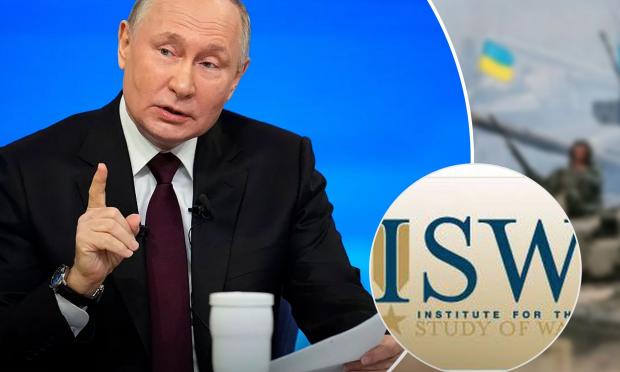While the war in the Gaza Strip rages on, with the US giving political and military support to Israel, its most important ally in the Middle East, Ukraine seems to be abandoned in terms of sending military aid by both the US and the EU.
The prestigious US Institute for the Study of War (ISW), concerned about this development, which if implemented will make Ukraine easy prey for Putin's troops, points out the dangers for the US-NATO-EU of Russia's crushing of Ukraine and its negative consequences for the years to come, noting:
The US has a much larger stake in Russia's war against Ukraine than most people believe.
Russia's conquest of all of Ukraine is possible if the US-EU cuts off military aid to Zelensky.
As Americans consider the cost of continuing aid to Ukraine to fight the Russians in the years ahead, they deserve a careful examination of the costs of allowing Russia to win.
A Russian conquest of the whole of Ukraine is not at all impossible if the United States cuts off all military aid and Europe follows suit.
Such an outcome would bring a wounded but triumphant Russian army to NATO's borders from the Black Sea to the Arctic Ocean.
What Putin's victory in Ukraine would entail
If Russia wins, its army at the end of this war will be experienced in combat and will be much larger than Russian ground forces before 2022.
A hypothetical Russian victory would allow the Russian economy to gradually recover as sanctions inevitably erode and Moscow develops ways to circumvent or mitigate those that remain.
A victorious Russia would over time replace its armaments and rebuild its power, building on the rich hard experience gained in the mechanized war with Ukraine.
If Russia wins in Ukraine, it will bring its advanced air defense systems to the NATO border where only U.S. stealth aircraft-which are critically needed to deter and counter China-can reliably penetrate.
A Russian victory in Ukraine would allow Russia to pose a significant conventional military threat to NATO for the first time since the 1990s in a time frame that is determined to a significant extent by how much the Kremlin invests in its military.
US moves in the event of Ukraine's collapse
To deter and defend against a renewed Russian threat following a full Russian victory in Ukraine, the US will need to deploy a significant portion of its ground forces in Eastern Europe.
The US would have to station large numbers of stealth aircraft in Europe, likely forcing the US to make a terrible choice between maintaining its power in Asia to defend Taiwan and its other Asian allies and deterring or defeating a Russian attack on NATO.
The whole project would cost a fortune and the cost would last as long as the Russian threat continues, possibly indefinitely. Almost any other outcome of the Ukraine war is preferable to this.
The prospects that loom
Helping Ukraine maintain the lines where it is through continued Western military support is a far more advantageous and cheaper option for the US than allowing Ukraine to lose.
Freezing the conflict is worse than continuing to send aid to Ukraine to continue the war since that would simply give Russia time and space to prepare for a new war to conquer Ukraine and counter NATO.
Helping Ukraine regain control of all or most of its territory would be far more beneficial as it would drive Russian forces even further east.
Best of all, supporting Ukraine to victory and then helping it rebuild would put the largest and most effective military on the European continent at the forefront of NATO's defense, whether or not Ukraine eventually joins the alliance.
As (ISW) we have argued strongly that American values are aligned with American interests in Ukraine and that there is a strong and persuasive values-based argument for helping it liberate all of its land and its people. We continue to believe that this is true.
But the American people are being asked to spend a lot of money to help Ukraine fight Russia, and it is not unreasonable to also wonder what the economic cost of not helping Ukraine will be.
NATO Secretary General's remarks on the course of the war in Ukraine
Finally, the NATO Secretary General, in an interview after his meeting with the Prime Minister of Slovakia, noted: "There are no signs that Putin is preparing for peace. On the contrary, the Kremlin is preparing for a long and hard war. Putin has put the Russian economy on a war footing. He is increasing arms production. And it is increasingly dependent on China, Iran and North Korea for weapons.
NATO is not a party to the conflict. But we support Ukraine's right to self-defence. It is enshrined in the UN Charter. I welcome Slovakia's support for the sovereignty and territorial integrity of Ukraine.
I welcome President Biden's clear commitment to Ukraine and his administration's urgent effort to provide Ukraine with much-needed assistance. European Union leaders will also discuss today the opening of accession negotiations with Kiev and additional financial support for Ukraine.
If Putin wins in Ukraine, there is a real risk that his aggression will not end there. Our support is not charity. It is an investment in our security."
A one-way street for the US-NATO-EU to continue sending military assistance to Ukraine
From the above we can see that for the US-NATO-EU, the benefits of continuing to send military aid to Ukraine to continue the war against Russia are many times greater in the medium and long term than those that would result from stopping it, with the certain result of Russia's overwhelming and total occupation of Ukraine.
What matters is whether the Republicans in the US will be persuaded to recover and whether the EU-NATO countries will continue to dig deep into their pockets in the midst of an economic crisis.



